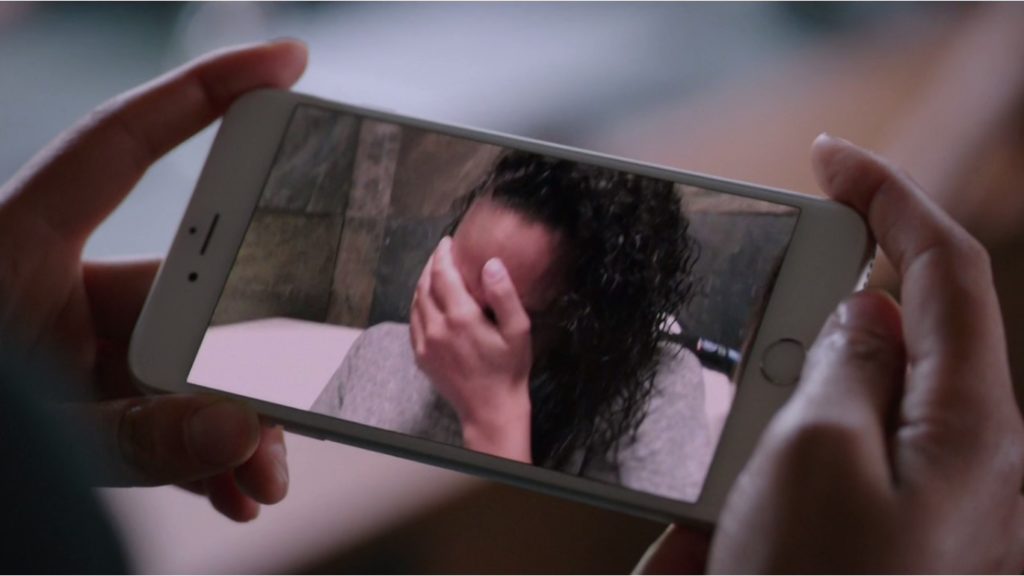Every other Saturday morning, I get up, and I go to a doctor’s appointment. That’s how it’s always explained to friends and extended family members. In reality, I’m going to my therapist’s house where I sit and chat in her living room or on her porch while her dog demands petting. But if anybody asks, it’s just a doctor’s appointment.
My best friends and I talked about everything in middle and high school–sex, school, kisses, the future, music, classes, politics, war, the mall–but we never talked about mental health, not really anyway. It was an open secret among my friends that I nearly attempted suicide in middle school, and I became someone to talk to if anyone else got close, but we never talked about depression or anxiety or any of the things that can bring someone to that edge. We talked around the actual subject matter. Talking about our periods, sex lives, shaving practices, and other “taboo” subjects related to our bodies–that was normal, natural after years of sharing locker rooms and taking health classes and going through puberty together. But we never had a catalyst for talking about mental health. We never had classes that taught us the language and the basics of what was and wasn’t normal; I spent years assuming the way I was feeling was just a part of being a preteen and a teen.
Which is just another reason Fox’s Pitch was so revolutionary. Pitch featured a black woman who was breaking down barriers on a major platform and trying to be successful and getting tons of media attention. And that weighed on her. The anxiety got to her. An entire episode was spent showing how the pressure was affecting her and her ability to pitch. Her closest friends recognize how she’s struggling and help her to admit it and get on medication to help her.

A woman on television on a major network had a mental illness. She admitted it was getting to her. She sought treatment. Then she carried on with her life and continued to be successful. The portrayal of a person dealing with mental illness the way Ginny Baker did was incredibly important in the world’s current climate. There are more and more external triggers for mental illnesses due to current events, which can combine with internal factors to really harm people.
But most media either doesn’t acknowledge mental illness or only acknowledges the very extreme cases, often in harmful ways. 13 Reasons Why, for example, treated depression as something that is caused entirely by external factors, leading to a very graphic suicide. While that can be a reality, that’s a very rare reality for most people with mental illnesses.
As a culture, we still don’t like to address mental illness head on. Some people like to act as though mental illnesses were just created by Millennials as a way to get attention, but most of us understand that Hamlet and Ophelia and Lady Macbeth were dealing with mental illnesses and that Mrs. Bennet’s “nerves” (in Pride and Prejudice) were what we would call anxiety today. That majority encourages going to therapy and taking medication when it’s needed, but it’s still a taboo to talk about getting help or to talk about mental illness outside of the doctor’s office. And if we do talk about it, we stick to euphemisms or vague terms.
“I get nervous.” “Just a bit down in the dumps today.” “I’ve got a doctor’s appointment.” My personal go-to when someone asks me how I’m doing when I’m in a low swing? “I’m tired.” The inevitable message becomes: It’s okay to be mentally ill these days but it’s not okay to talk about it.
Pitch explains exactly what the dangers of this narrative are, particularly in the sixth episode “Wear It.” In the episodes leading up to this, Ginny has to face some family trauma, deal with the trading deadline that could send her or her closest friends away from the team, and put up with a new addition to the team who wants to take her mentor’s position. The episode opens with Ginny getting a major deal as a representative of Nike and going to a party celebrating her new role. At the party, she meets a waitress and, after talking with her a bit about her life, she opts to leave the party with this girl and go to a more casual event. She gets drunk and falls off the grid, leaving the team executives and her agent worried about her. Video surfaces of her wearing New Balance–a direct competitor of Nike’s–sneakers while diving into a pool. But a second, more troubling video, is what leads to a conversation about Ginny’s mental health.

Ginny was filmed sitting in a bathroom with the waitress from the party. “I don’t want to go back,” she says, laughing. Then the laughter turns to tears. She covers her face and repeats, “I don’t want to go back.” She continues, “I don’t wanna; I just don’t wanna do it anymore…I don’t want to give careful quotes. I don’t wanna smile when I don’t wanna smile.” Ginny watches the video, surrounded by her agent, the team’s owner, the general manager, and her manager. She tries to play it off, tells them that she appreciates their concerns, but she’s fine. “No,” her manager says. “You’re not.”

Knowing she has their support and that they know there’s a problem, Ginny admits it. “No, I’m not. I’ll talk to your shrink or whatever.” And she walks into the room where the psychiatrist is waiting for her. Seeing a psychiatrist isn’t a one-time thing for Ginny, either. In the very next episode, after being pushed to go out with a friend who wants to talk with her, she jokes, “I already have a shrink.”
Ginny Baker did have a lot of external pressure; she was the first woman to break into Major League Baseball and being the first anything comes with a lot of expectations and attention that can pull somebody down. But Pitch also made sure to show that Ginny had internal triggers too; her father had set a very high bar for his daughter from a young age and he died before she made it to the majors. She was molded into a perfectionist and she had high expectations for herself, as well as the desire to make her father proud. Would the external pressure to succeed have been as hard to handle if she didn’t already have that internal drive?
On top of that, mental health medical experts are often poorly characterized. Psychiatrists and psychologists are often called quacks, portrayed as making up diagnoses and coming up with complexes to line their wallet. Even shows that don’t demonize these professionals–like Crazy Ex-Girlfriend, for example–still portray therapists as people who look at people’s trauma and see dollar signs. Pitch doesn’t do that. Ginny’s psychiatrist is there to push Ginny, to listen to her as she figures out her reality. One of the best examples of this is when Ginny says, “I’m the first woman in the majors; I can’t just decide to do something else.” Her psychiatrist pushes her, asks her why she can’t make that decision. “Because I’m not just me. I’m also that. That person in the ad, the in quotes Ginny Baker. I’m not that. I’m just me. And I don’t know if I want to do this.” Ginny finally admits to herself, out loud, that the pressure of being a role model and being a celebrity was never what she wanted. She’s also implying what viewers can see while watching the show; Ginny’s not even sure she wants to play baseball, but this is what she was pushed into.
After her admission, her psychiatrist looks around and says, “Hey look. The sky didn’t fall.” That’s the role mental health professionals play; they help people dig in to figure out the core of their issues, then help them work through that. And getting patients like Ginny Baker, like me, to realize what their issues are and be honest about them? That’s step one.

Pitch opened the door for us to have real, important conversations about mental health and how it’s a normal part of life for so many of us, as are the treatments for it. Pitch opened the door for us to talk about how mental health can be effected both externally and internally and that’s something that could be explored so much further in future episodes. The season ended with Ginny facing a major injury and likely a surgery while at the height of her season; she was just a few outs away from being the first woman and the first San Diego Padre to do so. The fallout from that, of trying to recover from such a massive injury that would knock her out of the game for a year, could have allowed for so much more exploration of Ginny’s mental health through that process. Viewers could’ve gotten a chance to see more of her treatment, whether that was with a psychiatrist or through medication.
It also could’ve opened the door for the show to dig into the mental health struggles others on the show might be dealing with; athletes are so rarely portrayed as having mental illness, despite the immense pressure and the constant threat of a career ending injury. One player in particular, Mike Lawson, is nearing the end of his career. The show frequently showcases the physical difficulties of years of playing ball on his body and the relationship difficulties he has, but never delves too far into how that could be affecting him mentally.
Pitch aired its first episode on September 22, 2016, the tenth and last episode airing on December 8. When it started on air, I was several months into figuring out what medication would best help me cope. I’d gotten my first prescription from my general practitioner in March, but hadn’t started seeing a psychiatrist until May, so we were still working out the kinks. By time the show ended, I had finally gotten a dosage that was keeping me stable. A few months after the last episode, I started seeing my therapist. I can’t claim that Ginny Baker’s struggle was the catalyst to me taking these steps and getting to this place; I’d been approaching this point for a while and was just finally ready. But Ginny’s story struggles stick with me. The constant pressure to be perfect I’ve struggled with in my life has lead to a lot of episodes of crying on floors, in bathrooms, just like Ginny did. Ginny Baker still needed help from professionals–plus help from an amazing support system–but she was still amazing. That reminder that people can deal with mental illness and still be incredible and successful is one I needed to see.
I’m thankful for Ginny Baker and Pitch and the realizations and conversations it provided for me and millions of other viewers, all in just ten episodes. I can only imagine what it would be able to do next if it hadn’t been cancelled. Instead, we have that one, beautiful season to watch over and over and build off of.

